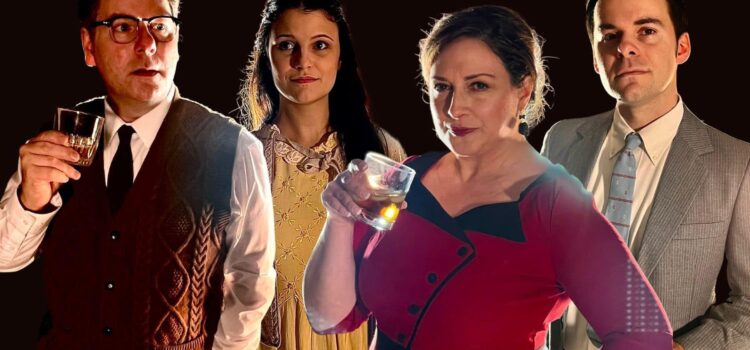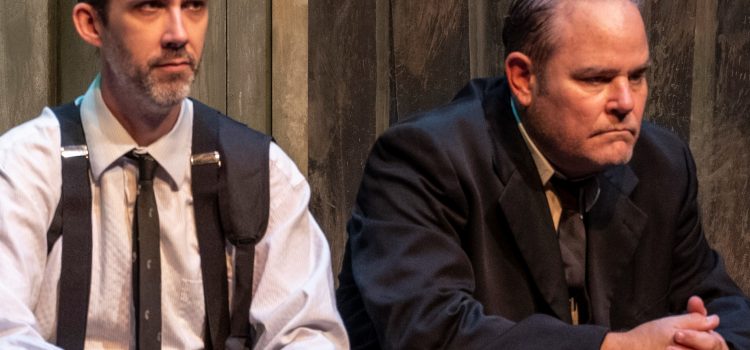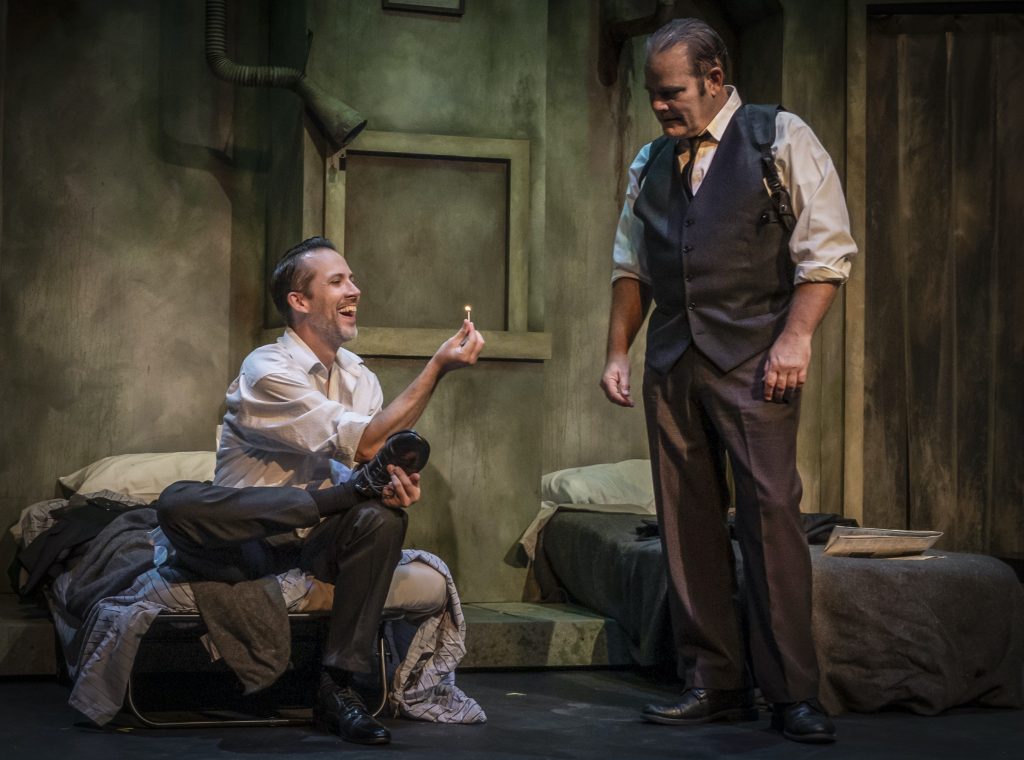By Lynn Venhaus
Stray Dog Theatre goes for the gusto in a blistering, shattering “Who’s Afraid of Virginia Woolf?” that features bravura performances and a fresh perspective on one of the landmark intellectual works of the 20th century.
Edward Albee’s 1962 dramatic comedy is divided into three acts that bristle with tension and increasingly unsettling confrontations are staged during a long night’s journey as two married couples peer into the abyss.
Passive-aggressive George (Stephen Peirick), an associate history professor at a small New England college, appears to be a milquetoast foil for his brassy and sassy wife, Martha (Mara Bollini), the attention-seeking daughter of the college president. After a faculty party, she has invited another couple back to their home on campus for more cocktails and conversation.
Nick (Stephen Henley) is an ambitious biology professor who is married to a sweet and naïve Honey (Claire Wenzel). They become ensnared in their dysfunctional hosts’ “Fun and Games” in Act One, as drinks flow into the wee hours of the morning and the booze-influenced patter grows uglier.
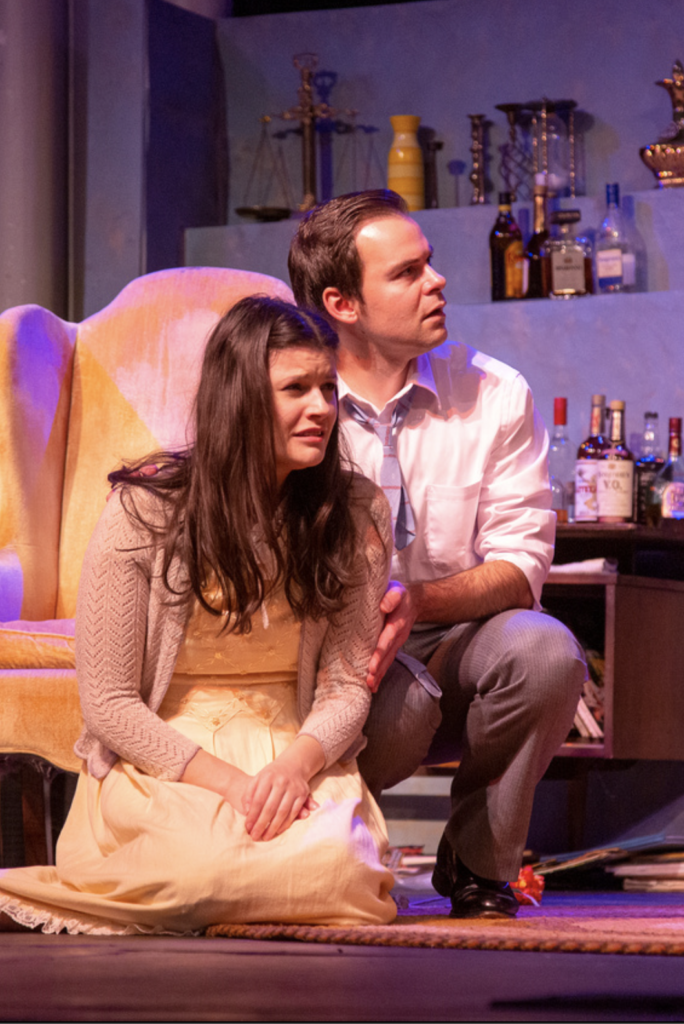
As the volatile middle-aged George and Martha viciously taunt each other, cracks in the young couple’s seemingly pleasant life are revealed, and the older couple is ready to pounce for sport. This isn’t their first rodeo. He seethes, she rages.
Everyone’s had a similar uncomfortable feeling around a bickering couple before, uneasy about the lack of a filter and polite behavior. Eager to please, the young folk stay, but as it gets later, it’s to their detriment – Nick is too power-hungry and Honey too vulnerable. Because the next act gets more disturbing, and the regrets start to pile up.
Act Two, titled “Walpurgisnacht,” is a reference to Christian missionary Saint Walpurga, who was known to repel witchcraft and helped convert Germany from heathenism. Known as an annual witches meeting, it typically takes place April 30, and there is a much longer backstory to know. Albee uses it for satirical reference. Of course.
Albee has the men argue more, and the insults begin. Martha will embarrass George’s literary efforts – with Bollini employing a haughty, degrading laugh meant to ridicule her husband. In turn, George becomes more contemptuous of the couple, devising a new game, “Get the Guests.”
Honey, drinking too much brandy, has a finicky stomach and becomes sick a couple times during these alarming encounters. Martha starts acting seductively towards Nick, which brings up more concerns.
Act Three, bluntly titled “The Exorcism,” is a devastating showcase of pain, pride, and purgatory. It takes on an eeriness not unlike a horror thriller, and sound designer Justin Been helps enhance a sense of danger and drama through cinematic score snippets that separate each act.
“Bringing Up Baby” is the next cruel game George demands they play. And they will reveal details about their son, which is complicated. This is by far the most destructive segment of the show, but also a twisted form of catharsis.
Using his wit and clever wordplay, Albee crafted a tragic circumstance around everyone’s illusions – how they see the world and how their inadequacies are part of their daily codependent lives. Their falsehoods are at times unclear, as Albee wanted to point out how society’s norms impede honesty. And their failures affect their mental health.
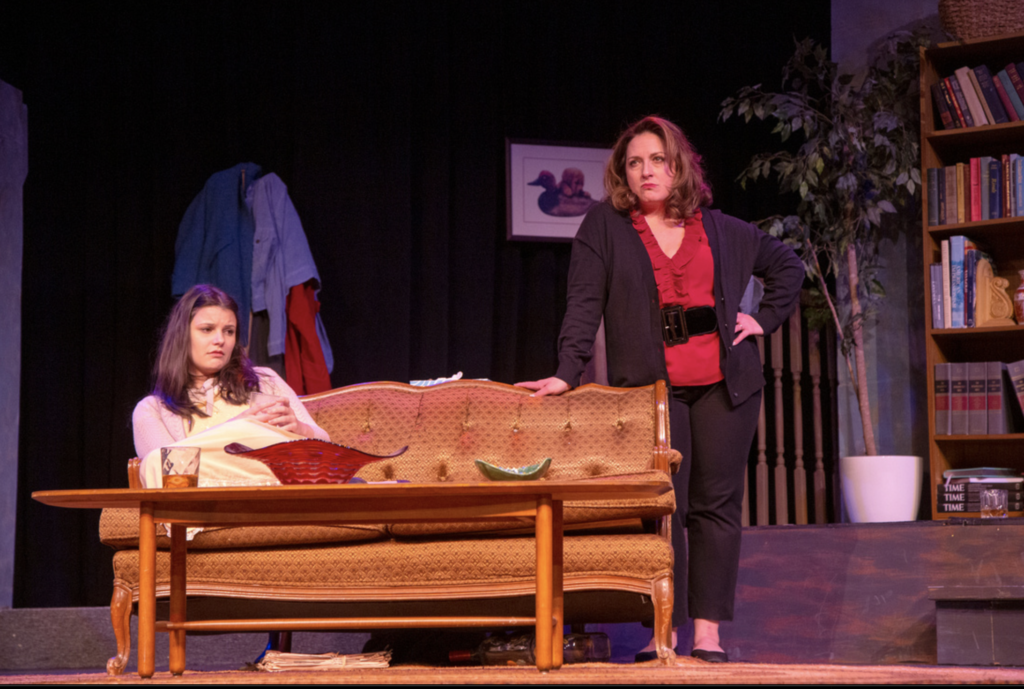
The fact that a play written 60 years earlier holds up so well is a testament to Director Gary F. Bell’s vision.
He has masterfully dissected this emotionally intense play, having the actors fully realize their characters’ psychological portraits by creating more layers and nuance.
These are demanding and difficult incendiary roles, ultimately about survivors, and the actors are up for the challenges, nimble in delivering Albee’s bitter and brittle dialogue. Not a one makes a false move – everyone defines their intentions clearly.
These are four characters with dashed dreams and multiple frustrations, and they take turns being defiant and trying to cling to their dignity.
Establishing a tempestuous dynamic, Peirick and Bollini dig deep for their revelatory gut-wrenching performances, and both are at their career best. Henley provides yet another interesting characterization as confident Nick who finds himself eviscerated. Newcomer Wenzel is impressive in her local debut as the impressionable young wife trying to meet the expectations of an American nuclear family.
The scale of each character’s dreams are vastly different, and it’s stunning to see how quickly things get out of control. The truths are harsh, the partying hard, and the humiliations fester.
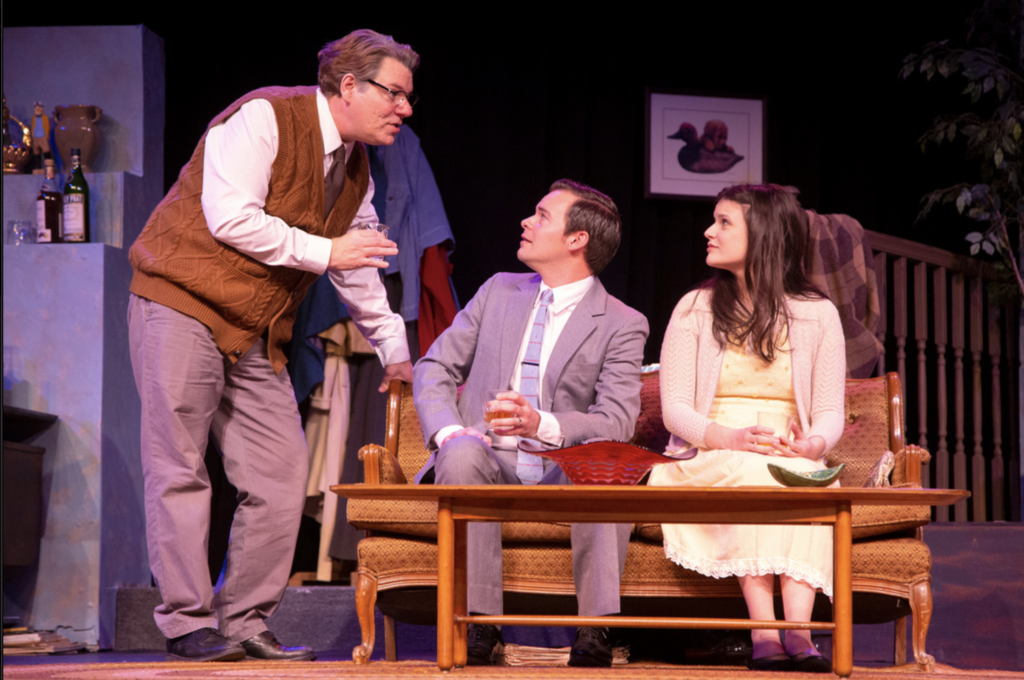
As scenic designer, Bell also capably created the modest worn living room where he fluidly moved the characters so nobody is static – and the bar gets a workout. As costume designer, he aptly outfitted the characters in appropriate career and party attire from that era. Lighting designer Tyler Duenow focuses on lighting several lamps in the interior.
The 1963 winner of the Tony Award for Best Play has enjoyed multiple revivals on Broadway, and this particular version produced by Stray Dog is the published 2005 revised script that starred Kathleen Turner as Martha, Bill Irwin as George, Mireille Enos as Honey and David Harbour as Nick.
This emotional roller-coaster of a production, certain to leave a lasting impression, is riveting throughout – even with its more than three-hour runtime. Adult themes are explored, and profanity is used. There are two 10-minute intermissions.
Stray Dog Theatre presents Edward Albee’s “Who’s Afraid of Virginia Woolf?” from Feb. 9 to Feb. 25, Thursday to Saturday at 8 p.m., at the Tower Grove Abbey, 2336 Tennessee Avenue, St. Louis, 63104. There will be a Sunday matinee at 2 p.m. on Feb. 19. For more information, visit www.straydogtheatre.org.
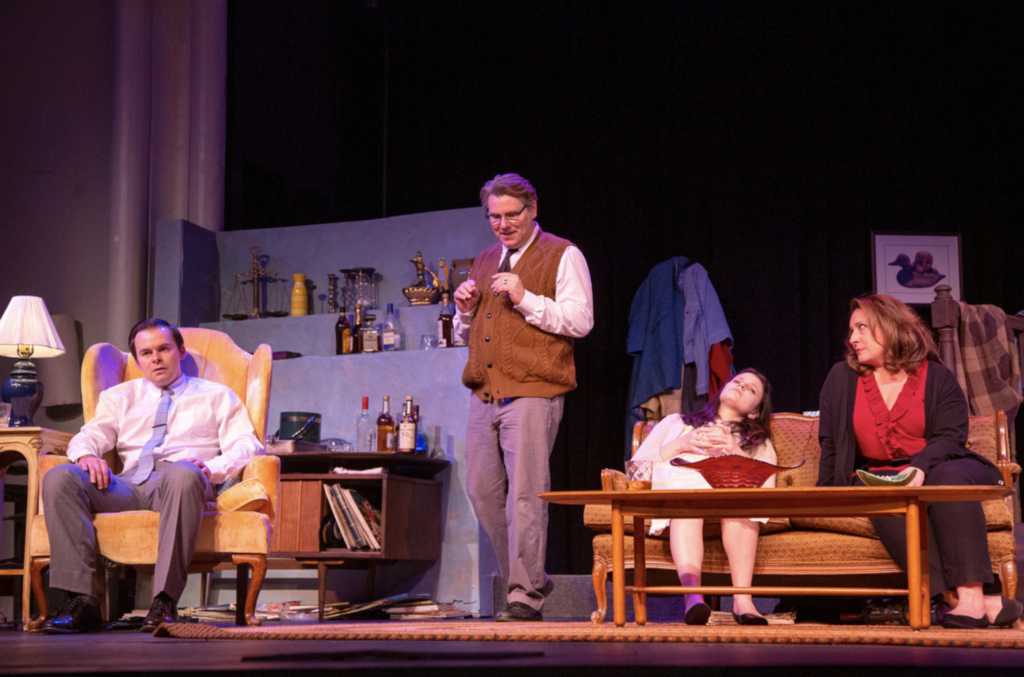
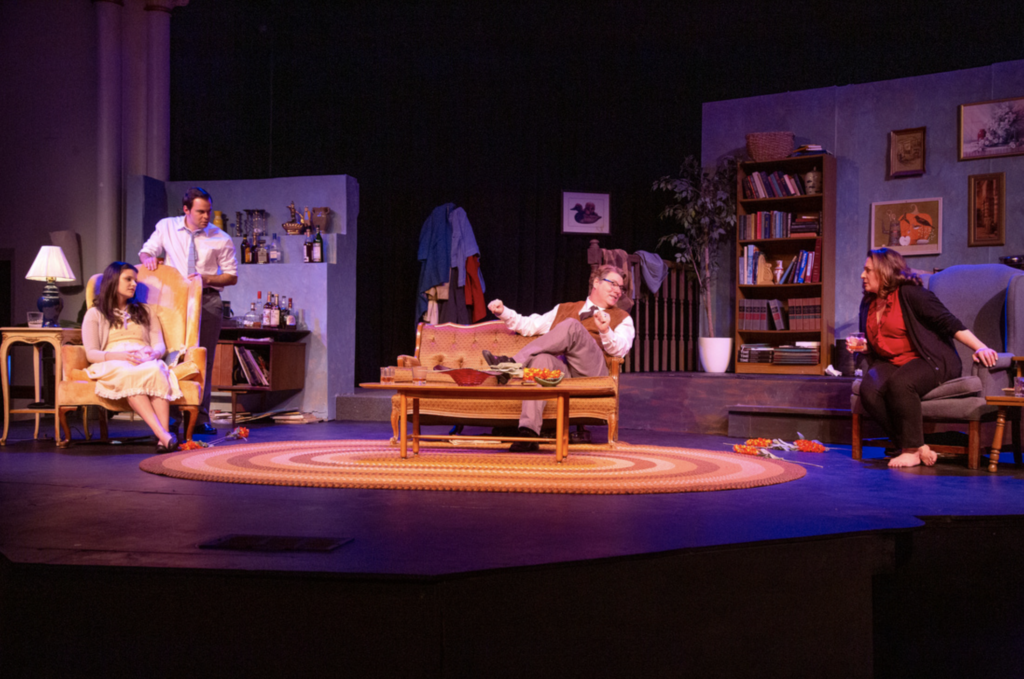

Lynn (Zipfel) Venhaus has had a continuous byline in St. Louis metro region publications since 1978. She writes features and news for Belleville News-Democrat and contributes to St. Louis magazine and other publications.
She is a Rotten Tomatoes-approved film critic, currently reviews films for Webster-Kirkwood Times and KTRS Radio, covers entertainment for PopLifeSTL.com and co-hosts podcast PopLifeSTL.com…Presents.
She is a member of Critics Choice Association, where she serves on the women’s and marketing committees; Alliance of Women Film Journalists; and on the board of the St. Louis Film Critics Association. She is a founding and board member of the St. Louis Theater Circle.
She is retired from teaching journalism/media as an adjunct college instructor.

